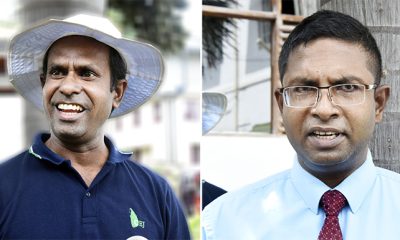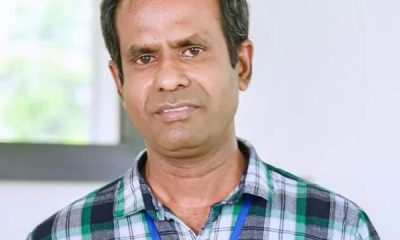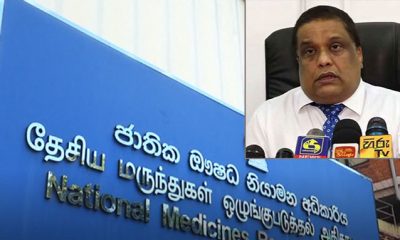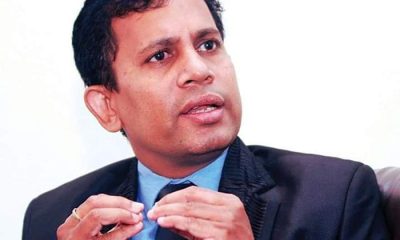News
NMRA blind to Bisphenol A danger
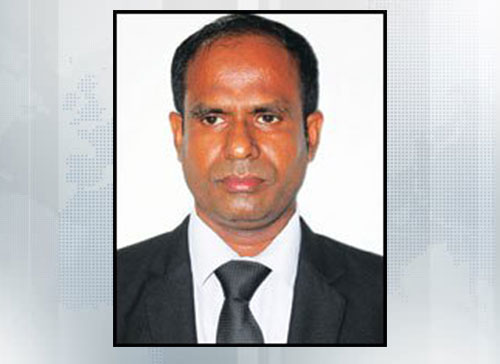
Keep your child safe from plastic food containers
By Ifham Nizam
Sri Lanka needs a gradual ban on plastic food containers widely used by children and instead alternative containers because testing facilities to detect harmful chemicals in them are sparse, says Centre for Environmental Justice (CEJ) Executive Director Dilena Pathragoda.
The CEJ director told The Island yesterday that the Court of Justice of the European Union had confirmed that Bisphenol A (BPA) must be listed as a `substance of very high concern’. He warned that further delay in decision-taking here in that regard increased threats to children’s health.
The CEJ revealed the presence of Bisphenol A in baby feeding bottles, juice feeders and feeding cups last February (2022).
The research team had been sharing study findings and recommendations with relevant stakeholders throughout the past few months but, the decision-makers do not seem to understand the depth of the issue, said CEJ Planning and Management officer Chalani Rubesinghe
In December 2021, the court of Justice of the European Union confirmed that BPA must be listed as a “substance of very high concern” considering its hormone-disrupting properties, while rejecting the attempt of Plastics Europe to reverse the decision of European Chemical Agency (ECHA) to identify BPA as an Endocrine Disruptive Chemical.
The European Food Safety Authority has now established a new permissibility total daily intake of 0.04 nanograms per kilogramme of body weight per day, drastically reducing its previous standard (4 micrograms per kilogramme of body weight per day) by 100,000 folds. [source: Morrison, O., EFSA poised to slash daily exposure limits for bisphenol A as EU court confirms it as ‘substance of very high concern’].
In the European Union, BPA is classified as a reproduction toxic, a substance that causes eye damage, respiratory irritation, skin allergies, and a potential hazard to the aquatic environment.
“Another important fact we identified in our study was despite having legal provisions and standards, plastic feeding bottles and cups can contain these chemicals. For example, in Malaysia use of BPAin polycarbonate baby bottles is prohibited. But our study found that one baby feeding bottle (“Minitree regular neck feeding bottle”), made in China and purchased in Malaysia, contained 2.6 µg/kg of BPA and it also had a “BPA-free” label,” Chalani said
Pathragoda said that their study had also found that two baby feeding bottles sold in Bhutan but made in India, where the use of BPA in baby feeding bottles is prohibited, had BPA levels of 0.6 and 3.2 µg/kg proving its non-compliance with Indian legislation. There was also a sample purchased from Bhutan, manufactured in Italy that contained BPA, 0.7 µg/kg. This indicates that having laws is not sufficient to stop manufacturers from using these chemicals and thereby will not ensure the chemical safety intended by the law.
“We believe that to ensure the safety of children, Sri Lanka must go for plastic-free alternative child food containers. The local market already has glass feeding bottles as an alternative and now there is a silicon cover for glass bottles that serves as a protective cover,” he added.
In the international markets, stainless-steel and silicon bottles are available as alternatives. In Sri Lanka, the feeding bottle importation license is issued by the NMRA (National Medicines Regulatory Authority). Therefore, the authority has the ability to prevent the importation of plastic feeding bottles and replace them with alternatives. But the authority doesn’t seem to be sensitive to this issue.
CEJ as an organization that cares for children’s health and the environment, proposes a complete ban on the importation and sale of feeding bottles made of polycarbonate materials, with a grace period given until a sufficient supply of glass, silicon or stainless-steel feeding bottles reaches the market, to prevent any unbearable price inflations applied to feeding bottles that may result in negative feedback leading to reverse the ban.
The CEJ director observed that in this matter, the Sri Lanka Standard Institution (SLSI) puts its best effort to bring the necessary standards. But it is questionable to what extent the standards on plastic can prevent Bisphenol A from seeping into the country through importation. It is a challenge for a country like Sri Lanka with fewer facilities to test chemicals like BPA and Phthalates.
The Sri Lanka Import/Export control heavily depends on the laboratories for testing and has no facility like an XRF scanner to facilitate immediate testing of harmful chemicals in imported items. Even then reluctance to take a brave decision like closing the entering gates for plastic feeding bottles (at least) is the misfortune of children in the country.
News
US sports envoys to Lanka to champion youth development

The U.S. Embassy in Colombo welcomed the U.S. Sports Envoys to Sri Lanka, former National Basketball Association (NBA) and Women’s National Basketball Association (WNBA) players Stephen Howard and Astou Ndiaye, from June 8 through 14.
The Public Diplomacy section of the U.S. Embassy said that it would launch a weeklong basketball program intended to harness the unifying power of sports, made possible through collaboration with Foundation of Goodness and IImpact Hoop Lab.
While in Sri Lanka, Howard and Ndiaye, both retired professional basketball players, will conduct a weeklong program, Hoops for Hope: Bridging Borders through Basketball. The Sports Envoys will lead basketball clinics and exhibition matches and engage in leadership sessions in Colombo and Southern Province for youth aged 14-18 from Northern, Uva, Eastern and Western Provinces, offering skills and leadership training both on and off the court. The U.S. Envoys will also share their expertise with the Sri Lanka Basketball Federation, national coaches, and players, furthering the development of basketball in the country. Beyond the clinics, they will collaborate with Sri Lankan schoolchildren to take part in a community service project in the Colombo area.
“We are so proud to welcome Stephen and Astou as our Sports Envoys to Sri Lanka, to build on the strong people-to-people connections between the United States and Sri Lanka,” said U.S. Ambassador Julie Chung. “The lessons that will be shared by our Sports Envoys – communication, teamwork, resilience, inclusion, and conflict resolution – are essential for leadership development, community building, equality, and peace. The U.S. Sports Envoy program is a testament to our belief that sports can be a powerful tool in promoting peace and unity.”
News
Rahuman questions sudden cancellation of leave of CEB employees

SJB Colombo District MP Mujibur Rahuman in parliament demanded to know from the government the reasons for CEB suspending the leave of all its employees until further notice from Thursday.
MP Rahuman said that the CEB has got an acting General Manager anew and the latter yesterday morning issued a circular suspending leave of all CEB employees with immediate effect until further notice.
“We demand that Minister Kanchana Wijesekera should explain this to the House. This circular was issued while this debate on the new Electricity Amendment Bill was pending. There are many who oppose this Bill. The Minister must tell parliament the reason for the urge to cancel the leave of CEB employees,” the MP said.However, Speaker Mahinda Yapa Abeywardena prevented Minister Wijesekera responding to the query and said that the matter raised by MP Rahuman was not relevant.
News
CIPM successfully concludes 8th Annual Symposium

The Chartered Institute of Personnel Management (CIPM) successfully concluded the 8th Annual CIPM Symposium, which took place on 31st May 2024. Themed “Nurturing the Human Element—Redefining HRM in a Rapidly Changing World,” the symposium underscored the pivotal role of human resource management (HRM) in today’s dynamic global landscape. Since its inception in 1959, CIPM has been dedicated to advancing the HR profession through education, professional development, and advocacy, solidifying its position as Sri Lanka’s leading professional body for HRM.
Ken Vijayakumar, the President of the CIPM, graced the occasion as the chief guest. The symposium commenced with the welcome address by the Chairperson, Prof. Arosha Adikaram, followed by the Web Launch of the Symposium Proceedings and Abstract Book by the CIPM President. The event featured distinguished addresses, including a speech by Chief Guest Ken Vijayakumar, President of CIPM, and an address by Guest of Honor Shakthi Ranatunga, Chief Operating Officer of MAS Holdings Pvt. Ltd., Sri Lanka.
The symposium also featured an inspiring keynote address by Prof. Mario Fernando, Professor of Management and Director of the Centre for Cross Cultural Management (CCCM) at the University of Wollongong, Australia.
Vote of Thanks of the inauguration session was delivered by Dr. Dillanjani Weeratunga, Symposium Co-chair.
The symposium served as a comprehensive platform for researchers to present their findings across a wide range of critical topics in HRM. These included Cultural Diversity and Inclusion, Talent Development and Retention, Ethical Leadership and Corporate Social Responsibility, Adapting to Technological Advancements, Mental Health and Well-being at Work, Global Workforce Challenges, Employee Empowerment, and Reskilling and Upskilling.
The plenary session was led by Prof. Wasantha Rajapakse. Certificates were awarded to the best paper presenters during the valedictory session, followed by a vote of thanks delivered by Kamani Perera, Manager of Research and Development.
The annual symposium of CIPM was a truly inclusive event, attracting a diverse audience that spanned undergraduates, graduates, working professionals, research scholars and lecturers. This widespread interest highlights the symposium’s significance in the field of HRM, offering a unique opportunity for everyone to network and learn from scholarly brains.The CIPM International Research Symposium was sponsored by Hambantota International Port, Sri Lanka Institute of Information Technology (SLIIT), E B Creasy & Co. PLC, and Print Xcel Company.


